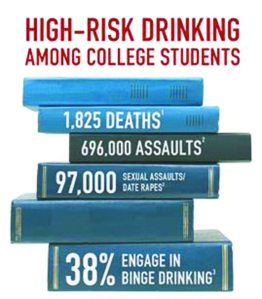 As college students arrive on campus this fall, it’s a time of new experiences, new friendships and making memories that will last a lifetime. Unfortunately for many, it is also a time of excessive and high-risk drinking which can negatively affect their health, safety and academic success.
As college students arrive on campus this fall, it’s a time of new experiences, new friendships and making memories that will last a lifetime. Unfortunately for many, it is also a time of excessive and high-risk drinking which can negatively affect their health, safety and academic success.
According to the National Institute on Alcohol Abuse and Alcoholism (NIAAA), anecdotal evidence suggests that the early weeks of the first semester are critical to academic success. Because many students initiate heavy drinking during this time, the potential exists for excessive alcohol consumption to interfere with successful adaptation to campus life. The transition to college is often difficult and about one-third of first-year students fail to enroll for their second year. Manhasset CASA suggests parents continuously talk with their college-age sons and daughters about the consequences of excessive drinking.
During these crucial early weeks, parents can do a number of things to stay involved and communicate with their children. They can inquire about campus alcohol policies, keep in touch with their sons and daughters, and ask about roommates and living arrangements. They should also discuss the penalties for underage drinking, and how alcohol use is often involved in sexual assaults, violence and academic failure.
For parents who want to discuss underage drinking with their college-bound sons and daughters, a variety of resources are available at www.collegedrinkingprevention.gov. These resources include a parents’ guide with helpful advice on staying involved during the freshman year and getting assistance if faced with an alcohol-related crisis. The website also provides links to alcohol policies at colleges across the country, an interactive diagram of how alcohol affects the human body and a blood alcohol content (BAC) calculator. On Manhasset CASA’s home page, www.manhassetcasa.org, you can also find the parent handbook: Talking with College Bound Students about Alcohol by Rob Turrisi, PhD, Prevention Research Center at Pennsylvania State University.
In addition, the Jeanne Clery Disclosure of Campus Security Policy & Campus Crime Statistics Act requires colleges and universities to publish an annual report disclosing campus security policies and three years’ worth of selected crime statistics, including liquor-law violations resulting in arrest or disciplinary referral. Parents can access their child’s college or university campus crime and security policies at http://ope.ed.gov/security.
According to the 2014 National Survey on Drug Use and Health (NSDUH), 59.8 percent of full-time college students ages 18 to 22 drank alcohol in the past month; 37.9 percent engaged in binge drinking (five or more drinks on an occasion); and 12.2 percent engaged in heavy drinking (five or more drinks on an occasion on five or more occasions per month). These rates are higher than those for their non-college attending peers.
The consequences of excessive drinking by college students are more significant, more destructive and more costly than many parents realize. Moreover, these consequences affect students whether or not they drink.

































